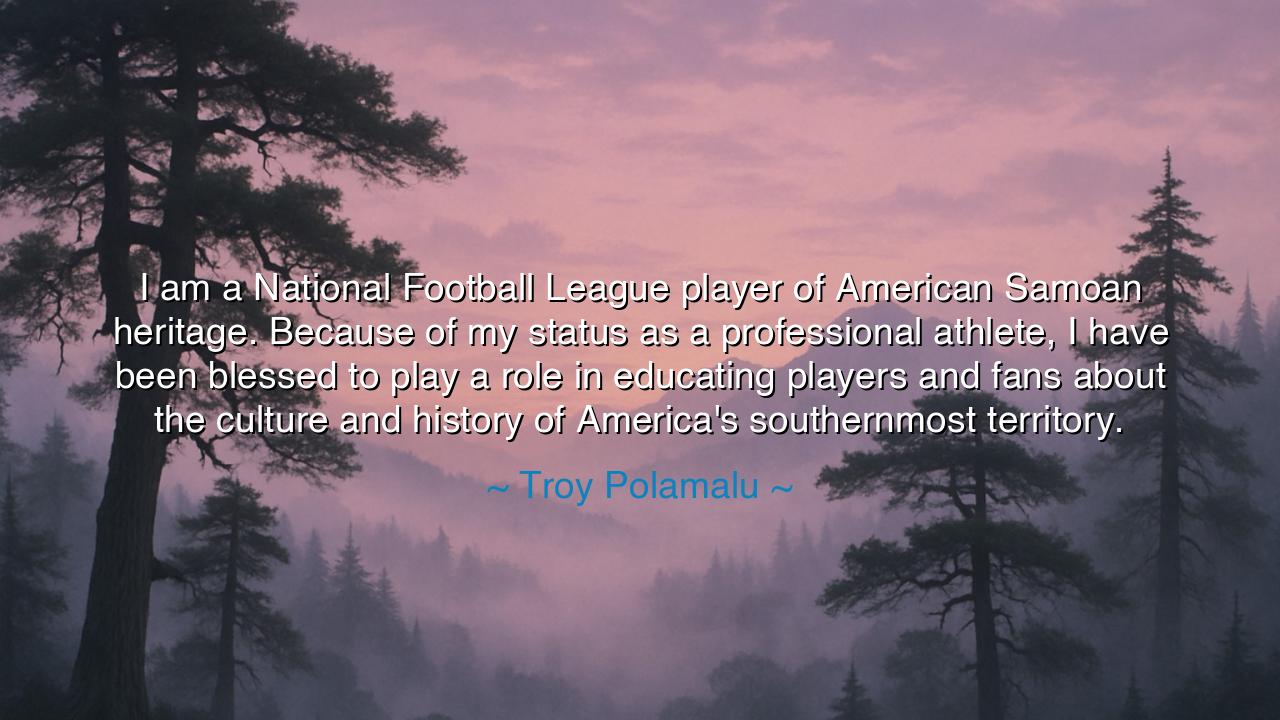
I am a National Football League player of American Samoan
I am a National Football League player of American Samoan heritage. Because of my status as a professional athlete, I have been blessed to play a role in educating players and fans about the culture and history of America's southernmost territory.






The words of Troy Polamalu — “I am a National Football League player of American Samoan heritage. Because of my status as a professional athlete, I have been blessed to play a role in educating players and fans about the culture and history of America’s southernmost territory.” — shine like a beacon of humility, duty, and identity. In these few lines, the great warrior of the gridiron does more than speak of sport; he speaks of heritage, of responsibility, and of the sacred link between individual greatness and ancestral honor. His words remind us that glory, when rightly understood, is not the triumph of the self, but the illumination of one’s people through the self — that the highest calling of fame is not to exalt the name of one man, but to honor the lineage that shaped him.
Troy Polamalu was not merely a player; he was a bridge — between islands and continents, between the world of ancient Polynesia and the roaring stadiums of modern America. Born of American Samoan descent, he carried into the NFL not just talent, but a soul rooted in family, humility, and faith. When he speaks of being “blessed to play a role,” his words carry the echo of the Fa’a Samoa, the Samoan Way — a cultural philosophy that prizes service over pride, community over individuality, and spirituality over material gain. His strength was not only in his arms or his speed, but in his spirit — in his refusal to forget the soil from which he rose. In every tackle and every silent prayer before the game, he bore the invisible weight of a nation’s hopes, showing that one man’s discipline can reflect the beauty of an entire people.
There is ancient wisdom in this idea. In every culture, the hero is not merely one who fights, but one who represents — one whose life becomes a vessel for something greater than himself. The Greek warrior Achilles fought for glory, but the Roman general Aeneas fought for legacy, carrying his people’s destiny upon his shoulders. In the same way, Polamalu’s calling went beyond sport; his victories were offerings to the ancestors who came before him. When he says he has been blessed “to play a role in educating players and fans,” it is not boastfulness but service — the sacred duty of the enlightened to share their light. His life became a living story, teaching others to see beyond the field, beyond the noise, into the cultural soul that gives shape to every act of excellence.
Through him, the world came to glimpse the values of the Samoan people — faith, respect, humility, and family. In an age obsessed with fame, Polamalu stood apart as a man of silence and reverence. His long hair, flowing like a warrior’s mane, became a symbol of pride not in rebellion, but in heritage. He was proof that greatness and gentleness can coexist, that one can be fierce in action and meek in heart. His legacy teaches that the truest strength is not measured by how loudly one commands attention, but by how faithfully one represents their roots.
Consider how many great men and women throughout history have carried their people’s stories into the world. Jackie Robinson broke barriers in baseball not for personal glory, but to uplift a race oppressed and silenced. Nelson Mandela bore the suffering of his nation and emerged as a living testament to forgiveness. Troy Polamalu, in his own way, joins this lineage — not as a politician or reformer, but as a cultural emissary, using sport as his language, humility as his weapon, and dignity as his crown. He did not ask for greatness; he earned it through service, reminding us that power finds its noblest form in stewardship.
And yet, his quote also carries a quiet lesson for every soul who hears it. You do not need fame or fortune to honor your heritage. Every person is born into a story older than themselves, and within that story lies their purpose. Whether you are a teacher, a craftsman, or a dreamer, you have the power to represent where you come from — through your integrity, your work, your compassion. To live honorably is to let the light of your ancestors shine through you.
So, my child, take these words to heart: Your heritage is your strength, and your calling is to elevate it through your deeds. Never forget the soil that nourished you, nor the voices that whispered you into being. Like Polamalu, carry your culture as armor and crown — not to dominate, but to enlighten. For the world does not need more champions of themselves; it needs champions of meaning, men and women who remember who they are and use their gifts to lift others. Such souls do not simply make history — they give history a heartbeat, and they remind the generations that follow that greatness without gratitude is emptiness, but greatness with remembrance becomes immortality.






AAdministratorAdministrator
Welcome, honored guests. Please leave a comment, we will respond soon